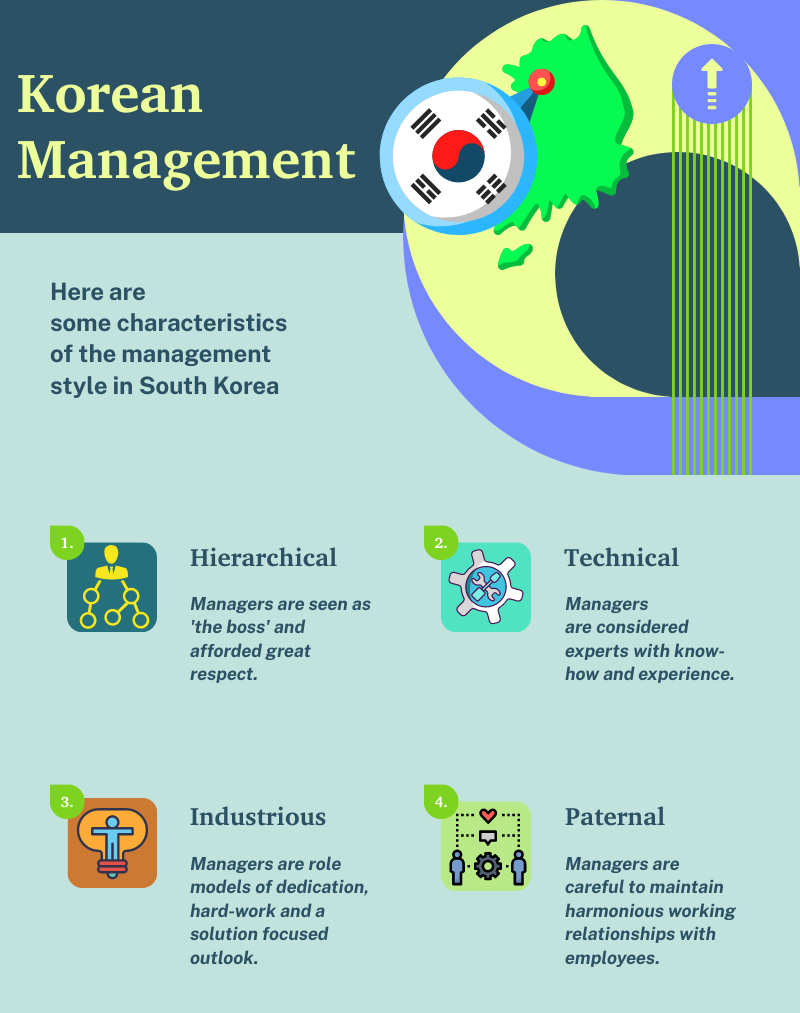
Cross Cultural Management Guide for South Korea
The guide below is for managers who want to learn more about the management style and business culture of South Korea.
It provides some useful information for managers who are relocating to the country for employment as well as those who may have Korean employees in their global or multicultural teams.
Topics include:
- Hierarchy
- Leadership style
- Time and scheduling
- Communication style and;
- Negotiation style
Being a Manager in South Korea
The South Korean management style is known for being hierarchical, collectivist, and focused on hard work and dedication. It places a strong emphasis on respecting authority and following rules, with a clear division between senior and junior employees. The company culture often centres around long working hours and a strong sense of loyalty to the organization.
- This is a culture that respects hierarchy as can be seen in the use of the word "sonsaengnim", which means "respected person," that is frequently used when addressing someone of a higher status.
- A South Korean businessperson will want to know your name and which company you represent.
- In business, it is important to maintain a degree of formality.
- Older South Koreans and those in senior positions should be treated with respect and deference.
- Although leadership is hierarchical and paternalistic, it is also heavily shaped by the Korean concept of 'inwha', which emphasises harmony.
The Role of a Manager
In recent years, there has been a shift towards more flexible and innovative management styles in some South Korean companies, with an emphasis on creativity and innovation. However, traditional hierarchical structures and a strong focus on conformity and obedience to authority continue to be a defining feature of the South Korean management style.
- In South Korea, as in other hierarchical societies, managers may take a somewhat paternalistic attitude to their employees.
- They may demonstrate a concern for employees that goes beyond the workplace and strictly professional concerns.
- In management positions, there is also a strong emphasis on education and qualifications, with many South Koreans pursuing advanced degrees and professional certifications.
- This focus on education and continuous learning is reflected in the importance placed on training and development programs within companies.
Approach to Change
South Korean culture has a medium tolerance for change. This means that change can be difficult to bring about and usually take longer.
- Projects and proposals will need to be carefully analyzed every step of the way to assure that all the risks have been assessed and understood.
- Failure in South Korea causes a long-term loss of confidence in the individual as well as in others.
- Because of this attitude, cultural sensitivity is going to be required, especially when conducting group meetings and discussing contributions made by participating individuals.
Approach to Time and Priorities
South Korea is a fluid time culture, and as is the case with many fluid time cultures, it is also very relationship-oriented.
- “Korean time” describes the relaxed attitude with which people approach appointment times and deadlines.
- People in South Korea will not want to upset others to force adherence to a deadline.
- However, global working means that some managers may have a greater appreciation of the need to enforce timescales and as such, agreed deadlines are more likely to be met.
Decision Making
Seniority is equated with rank and authority and demands strict conformity to a meticulously prescribed protocol.
- Koreans use a process of consensus decision-making in certain situations, which is similar to other countries in the region.
- High-ranking employees tend to have more power over their subordinates.
- Decision-making follows a formal procedure in which senior approval is necessary but uses input collected from subordinates.
Boss or Team Player?
Management styles are a combination of Confucianism and modern management theory, depending upon the person’s education and background.
- Teamwork and collaboration are highly valued in South Korean workplaces, and employees are often expected to put the needs of the group ahead of their own goals.
- This is reinforced through group activities and team-building exercises.
- Personal opinions and criticism are suppressed and the team generally follows the ideas of the more senior members of the team.
- Disagreements are voiced privately and rarely, if ever, in public.
Communication and Negotiation Styles
Personal relationships are required for successful business relationships.
- The South Korean communication pattern is generally indirect in nature.
- They tend to rely less on words and are attentive to body language and non-verbal communication.
- Speech can be purposefully ambiguous to create space for different interpretations.
- People can be very understated; the purpose of this is to maintain harmony and prevent a loss of face.
- When negotiating, find out who will be represented on the opposite team and try to bring team members who will be a good match in rank, skill, and perspective.
- Begin with a price that leaves room for negotiation and find areas in your position where you can be flexible.
- Do not include triangles in your presentation or visual aids as they have a negative connotation.
- Do not use high-pressure sales tactics.
- South Koreans do not like detailed contracts.
- They prefer sufficient flexibility to adjust to changing circumstances.
Get an Expert's Support
If you want help navigating Korean business culture, then a two-hour live webinar with one of our experts can accelerate your learning.
Our courses are all tailored to client needs.

 +44 0330 027 0207 or +1 (818) 532-6908
+44 0330 027 0207 or +1 (818) 532-6908

